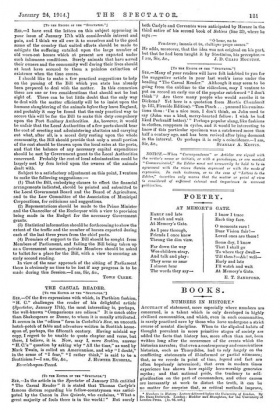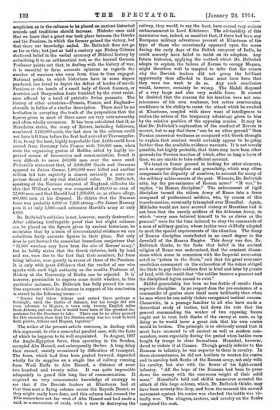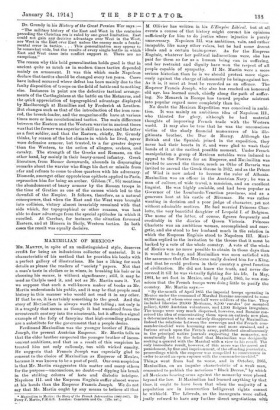BOOKS.
NUMBERS IN HISTORY.* ACCURACY of statement, more especially where numbers are concerned, is a talent which is only developed in highly civilized communities, and which, even in such communities, is rarely practised save by those who have undergone a strict course of mental discipline. When to the slipshod habits of thought prevalent in more primitive stages of society are added the facts that history has, more often than not, been written long after the occurrence of the events which the historian narrates; that even a contemporary and conscientious historian, such as Thucydidee, had to rely largely on the conflicting statements of ill-informed or partial witnesses; that, as we recede in point of time, legend and fact are often hopelessly intermixed; that even in modern times experience has shown how rapidly hero-worship generates myths ; and that national pride, the tendency to self- glorification on the part of commanders, and other causes are incessantly at work to distort the truth, it can be no matter for surprise that, as critical methods improve,
• Ntna,rs in Melon: Lecture delivered before the University of London. By Dr. Hans Delbrack, London: Hodder end Stoughton, tor the University ot London Press. [lo. 6d. net]
scepticism as to the reliance to be placed on ancient historical records and traditions should increase. Niebuhr once said that we knew that a great war took place between the Greeks and the Persians, in which the former gained the victory, but that there our knowledge ended. Dr. Delbriiek does not go so far as this; but just as half a century ago Bishop Coleneo shattered belief in the verbal accuracy of Biblical history by submitting it to an arithmetical test, so the learned German Professor points out that, in dealing with the history of war, it is essential to form accurate opinions as regards the number of warriors who were from time to time engaged. National pride, to which historians have in some degree pandered, has loved to depict the defeat of hordes of servile Persians at the bands of a small body of Greek freemen, or Austrian and Burgundian hosts humbled by the stout resist- ance offered by a band of patriotic Swiss peasants. The history of other countries—Prussia, France, and England— abounds in fables of a similar description. There need be no hesitation in accepting the truth of the proposition that the figures given in most of these cases are very untrustworthy and often wholly erroneous. It has been calculated that if, as Herodetus states, the army of Xerxes, including followers, numbered .5,100,000 souls, the last man in the column could not have left Snsa before the first had arrived at Thermopylae. It is, to say the least, highly improbable that Attila could have moved from Germany into France with 700,000 men, when even the organizing genius of Moltke, aided by highly im- proved means of locomotion and communication, found it very difficult to move 500,000 men over the same road. Plutarch's statement that, of 3,000,000 Gauls and Germans opposed to Julius Caesar, 1,000,000 were killed and another million led into captivity is almost certainly a mere con- jecture devoid of any real statistical value. Dr. Delbrilek, speaking of the Norman conquest of England, ridicules the idea that William's army was composed of 60,000 or even of 32,000 men, and that Harold had 1,200,000, or, as others allege, 400,000, men at his disposal. He thinks that the Norman force was probably 6,000 or 7,000 strong—Sir James Ramsay puts it at only 5,000—and estimates Harold's army at only 4,000.
Dr. Delbriick's criticism is not, however, merely destructive. After adducing irrefragable proof that but slight reliance can be placed on the figures given by ancient historians, he maintains that by a train of circumstantial evidence we can substitute fairly accurate figures in their place. Not only does he put forward the somewhat hazardous conjecture that "15,000 warriors may have been the size of Xerxes' army," but he boldly states that the Greek victories, both by land end sea, were due to the fact that their numbers, far from being inferior, were greatly in excess of those of the Persians. It is only with great diffidence that the verdict of one who speaks with such high authority as the erudite Professor of History at the University of Berlin can be rejected. It is, however, permissible to express some doubt whether, in this particular instance, Dr. Delbriick has fully proved his case. One argument which he advances in support of his conclusion is stated in the following terms :— " Xerxes had taken Athens and rested there perhaps a fortnight, until the Battle of Salamis, but his troops did not even advance to Megam, a town only twenty English miles from Athens, and one that it would have been of the greatest im- portance for the Persians to take. There can be no other ground for this omission than that the Persian army was too weak to hold both points, Athens and kfegara, together."
The writer of the present article ventures, in dealing with this argument, to cite a somewhat parallel case, with the facts of which he happens to be well acquainted. In August, 1897 the Anglo-Egyptian force, then operating in the Soudan, occupied Abu flamed, and subsequently Berber. A long delay then ensued, mainly occasioned by difficulties of transport. The force, which had thus been pushed forward, depended wholly for its supplies on a single line of railway running from Wadi Haifa to Abu Named, a distance of some two hundred and twenty miles. It was quite impossible adequately to guard this long line of communication. It required no very consummate knowledge of strategy to see that if the Dervish leaders at Khartoum had at that time sent a flying column across the Bayuda Desert, as they might easily have done, and this column had crossed the Nile somewhere not far west of Alm Named and had made a raid, or a succession of raids, with a view to destroying the railway, they would, to say the least, have caused very serious embarrassment to Lord Kitchener. The advisability of this manceuvre was, indeed, so manifest that, if there had been any European military adventurer present at Khartoum of the type of those who occasionally appeared upon the scene during the early days of the British conquest of India, he could scarcely have failed to insist on its adoption. Any future historian, applying the method which Dr. Delhi-lick adopts to explain the failure of Xerxes to occupy Megara, might therefore well be tempted to infer that the reason why the Dervish leaders did not grasp the brilliant opportunity thus afforded to them mast have been that they were too weak to do so. Any such conclusion would, however, certainly be wrong. The Mahdi disposed of a very large and also rely mobile force. It cannot be doubted that the reasons for his inaction were not con- sciousness of his own weakness, but rather overweening confidence in his ability to resist the attack which he awaited at Khartoum, coupled with sheer want of intelligence to realize the nature of the temporary advantage given to him by the relative position of the opposing armies. It may be that Dr. Delbriick's explanation of the conduct of Xerxes is correct, but to say that there "eon be no other ground" than Persian numerical weakness as compared with Greek strength to explain that conduct would certainly appear to be going farther than the available evidence warrants. It is not merely possible, but highly probable, that there may have been other groundsfor Persian inaction of which, after so long a lapse of time, we are unable to take sufficient account.
We tread on firmer ground in looking for other elements, such as superior discipline and generalship, which may often compensate for disparity of numbers, to account for many of the military achievements of the past. Wherein, Dr. Delbrfick asks, lay the pre.eminence of Roman arms ? "It was," he replies, "in Roman discipline." The enforcement of rigid discipline turned the citizen Army of Rome into a force composed of professional soldiers, who, by reason of this transformation, eventually triumphed over Hannibal. Again, Miltiades would not have secured victory at Marathon had it not been that the unruly soldiers of the Athenian Army, in which "every man believed himself to be as clever as the general," were for the time induced to obey the commands of a man of military genius, whose tactics were skilfully adapted to meet the special requirements of the situation. The decay of Roman discipline contributed in no small degree to the downfall of the Roman Empire. This decay was due, Dr. Delbreck thinks, to the facts that belief in the ancient religion of Rome was undermined, that the constant dimen- sions which arose in connexion with the Imperial Stieeenion acted as "poison to the State," and that the great economic revolution consequent on the exhaustion of the mines obliged the State to pay their soldiers first in kind and later by grants of land, with the result that "the soldier became a peasant and the disciplined legion ceased to exist."
Skilful generalship has been no less fertile of results than superior discipline. In no respect does the pre-eminence of a. commander of genius show itself more brilliantly than when he sees where he can safely violate recognized tactical canons. Clausewitz, in a passage familiar to all who have made a theoretical study of tactics, laid down the rule that the general commanding the weaker of two opposing forces ought not to turn both flanks of the enemy at once, as by doing so he would incur a great risk that his own centre would be broken. The principle is so obviously sound that ib must have occurred to all ancient as well as modern com- manders, more especially during the period when battlea were fought by troops in close formations. Hannibal, however, dared to violate it at Cannae. Though greatly inferior to the Romans in infantry, he was superior to them in cavalry. In these circumstances, he did not hesitate to weaken his centre and to envelop both flanks of the Roman army, not only with his cavalry, but also with the flower of his light-armed infantry. "AU the hope of the Romans had been to press down the enemy with the enormous weight of their solid mass." Hannibal's bold and skilful manccuvre arrested the attack of this huge column, which, Dr. Delbriick thinks, may have been seventy-five deep, and from the moment the onward movement against his centre was checked the battle was vir- tually won. The slingeni, archers, and cavalry on the flanks completed the rout, Dr. Grundy in his History of the Great Persian War says " The military history of the East and West in the centuries preceding the Christian era is ruled by one great limitation. Past could not gain any decisive advantage over West in the West, nor West in the East over Past unless the enemy made a funda-
mental error in tactics. . Thin generalization may appear to be somewhat wide, but the results of every single battle in which East and West came into conflict support it. There are no exceptions."
The reason why this bold generalization holds good is that in ancient quite as much as in modern times tactics depended mainly on armament. It was this which made Napoleon declare that tactics should be changed every ten years. Cases have indeed occurred where defeat has been mainly due to the faulty disposition of troops on the field of battle and to nothing else. Instances in point are the defective tactical arrange- ments of the Carthaginians at the battle on the Metaurus, and the quick appreciation of topographical advantage displayed by Marlborough at Ramillies and by Frederick at Leuthen. But changes such as that of the introduction of the iron ram- rod, the breech-loader, and the magazine-rifle have at various times more or less revolutionized tactics. The main difference between the Eastern and the Western warrior in ancient times was that the former was superiorin skill as a horse and the latter as a foot soldier, and that the Eastern, chiefly, Dr. Grundy thinks, by reason of the hot climate in which he lived, never wore defensive armour, but trusted, to a far greater degree than the Western, to the action of stingers, archers, and cavalry. The strength of the Greeks and Romans, on the other hand, lay mainly in their heavy-armed infantry. Greek literature, from Homer downwards, abounds in disparaging 'remarks about the warrior who flings his dart or missile from afar and refuses to come to close quarters with his adversary. Diomede, amongst other opprobrious epithets applied to Paris, reproaches him for being an archer. Gibbon (V., 85) mentions the abandonment of heavy armour by the Roman troops in the time of Gentian as one of the causes which led to the downfall of the Empire. It follows, therefore, as a natural consequence, that when the East and the West were brought into collision, victory almost invariably remained with that side which, for topographical or other reasons, was best able to draw advantage from the special aptitudes in which it excelled. At Carrhae, for instance, the situation favoured Eastern, and at Hinkle in Sicily. Western tactics. In both
cases the result was equally decisive. C.








































 Previous page
Previous page